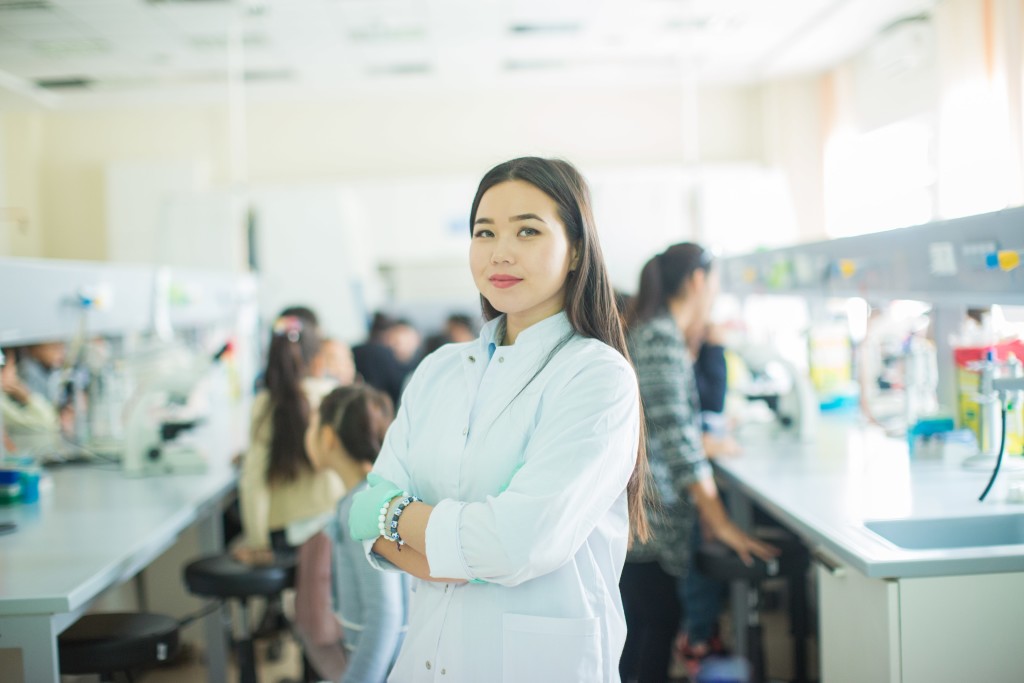ASTANA – Zarina Sautbayeva, one of Kazakhstan’s 100 New Faces, believes curiosity and diligence are essential virtues of a successful scientist. She teaches biology at Nazarbayev University (NU) and researches micro particles in an effort to identify a method for early cancer diagnosis.
“I think students need to be taught how to think and analyse the facts. I do not give students the correct answers right away; I want them to find solutions themselves. They need to know the reason why they carry out a particular action while conducting research. Aspiring scientists also should nurture curiosity and hard work to achieve success in the academic realm,” she said.
Sautbayeva received a Bolashak scholarship to obtain a Bachelor’s degree in Biomedical Sciences from the University of Manchester in the United Kingdom. Later, she did research internships at Basel University, Switzerland, and Harvard Medical School, USA. Sautbayeva was also awarded an International Cancer Technology Transfer Fellowship (ICRETT) by the Union for International Cancer Control (UICC). She currently works as a biology instructor for undergraduate students and conducts research at the university’s National Laboratory Astana.
“There are a lot of talented students in the university. Each of them has received a scholarship to study and therefore they know the value of education. Our students have aspirations and are also competitive internationally. For example, in summer 2016 three junior students from Harvard University came to do research in our laboratory. Although I was impressed by their skills and determination, our students are also gifted and knowledgeable,” she noted.
Sautbayeva believes every person has a natural inclination for a particular subject which it is crucial to identify and further develop. Fortunately, NU’s undergraduate degree requirements allow students to study different subjects, including general science, social sciences and humanities.
“I have always been especially keen on studying and I did not like the summer holidays. During school years, I read books on holidays and watched interesting series. I believe my curiosity and thirst for knowledge helped me succeed. The undergraduate study was difficult for me since I was studying abroad, but brought me genuine pleasure. I was curious about pathologies, in particular,” she said.
Having studied biomedicine, Sautbayeva went on to do research related to oncology. She is part of a team investigating the micro particles circulating in the blood of colorectal cancer patients, which they hope will allow for early diagnosis using blood samples. Doctors treat illnesses, whereas biomedical researchers work to prevent those illnesses.
“There are favourable conditions for science development in Kazakhstan. Researchers have the necessary facilities and equipment; however, the most important thing is that there is well-qualified human capital. There are a lot of promising scientists; most of them are also Bolashak scholars. They have creative ideas and are willing to dedicate themselves to research. Of course, there are problems such as bureaucracy and lack of funds; however, they are ubiquitous,” she said.
Apart from research and biology, Sautbayeva enjoys travelling, particularly going off the beaten path. Along with her friends they recently went on an expedition to the Himalayas. During her free time, she does yoga to gain energy.
“Science is always changing and in order to be competitive I need to study continuously. I will certainly pursue a PhD and most likely study oncology. In the future, I want to lead my own research projects,” said Sautbayeva.

